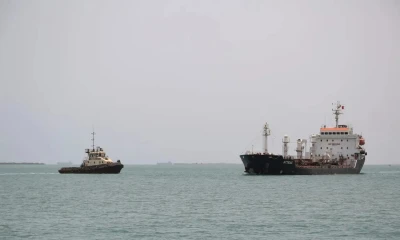Edited by Deepali Verma
Houthi militants have been launching surprise attacks on civilian ships in the Red Sea for approximately two months now. Its most recent target was a tanker that was operating on the behalf of trading giant Trafigura Group, carrying a cargo of Russian fuel got struck by a missile as it left the Red Sea. Repeated rounds of retaliatory strikes by the US and its allies have seen no success so far in stopping the assaults. These tensions are threatening not only trade routes but also the broader global supply chain.
The Big Take, in conversation with Bloomberg News reporters Enda Curran in Washington, DC and Mohammed Hatem, who primarily report on the economics and politics in Yemen, about the potential factors that led us to this point and how the companies are trying to strengthen their supply chains in the current atmosphere of uncertainty.
A Trafigura spokesperson’s statement in the light of the most significant attack yet by Yemen’s Houthi rebels on an oil-carrying vessel read, “Firefighting equipment on board are undergoing deployment to suppress and control the fire caused in one cargo tank on the starboard side. We are in contact with the vessel and are closely monitoring the situation carefully. Military ships in the region are underway to provide assistance.”
Yemen’s Houthi rebels claimed their strike on the Marlin Luanda which is the vessel carrying Russian-origin naphtha, that is, a product crucial for making plastics and gasoline. Naphtha is purchased below the price cap imposed by the Group of Seven nations, said the Trafigura spokesperson.
The attack is bound to raise a fresh set of questions on whether oil tankers will continue transiting via the Red Sea. Owing to the joint US and UK airstrikes on the Houthis earlier this month, tanker traffic in the region has gone down but some oil exporters, such as Saudi Arabia, continue to use the waterway.
The fact that the targeted ship carried fuel from Russia will likely be of concern to Moscow. Huge portions of the Russian petroleum presently passes through the southern Red Sea to reach Asian buyers after Europe’s shunning of its cargoes because of the war in Ukraine. Earlier, a Houthi spokesman informed the Russian newspaper Izvestia that Russian and Chinese ships that sail through the Red Sea would be safe even as the group targets US and UK vessels.
The vessel collected its Russia-origin cargo via a so-called ship-to-ship transfer from a stretch of water in the Laconian Gulf in southern Greece, as per the data from analytics firm Kpler. The area is key in helping Russia get its petroleum to the global market as well as handling supplies under the price cap. It has also left room for facilitating more shadowy trades.
Trafigura as well as other commodity traders like Glencore Plc, Vitol Group and Gunvor Group, was among one of the biggest lifters of oil from Russia before the country’s engaged in the full-scale invasion of Ukraine and was a partner in a major oil project run by state producer Rosneft PJSC.
The company has since distanced itself from those flows after US, European and UK sanctions on Russia’s energy exports. Its CEO Jeremy Weir said they still continue to trade tiny amounts of refined oil products from Russia.
The company picked up cargo via ship-to-ship transfer off the coast of Greece. This highlights how one of the world’s largest commodity trading houses is resorting to less-than-transparent means as it continues its export of oil products from Russia, at a time when war in Ukraine still rages.
Further, the latest incident indicates that the US and its allies still haven’t sufficiently degraded the Houthis’ military capabilities almost two weeks after launching several airstrikes on the group’s missiles, radars and other assets across Yemen. US Deputy National Security Advisor Jon Finer said military actions to deter the Houthis along with other groups backed by Iran would take time.
Updating the incident, the UK Navy remarked that the vessel remained ablaze and that coalition warships were monitoring the scene, laying out additional advice to the ships to transit with caution.
Missiles exploded near a Panama-flagged, Bharat-affiliated ship carrying barrels from Russia in the early hours of January 26, according to Ambrey.

















